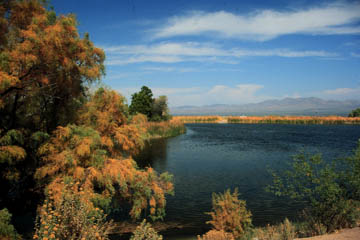
[Source: Anne T. Denogean, Tucson Citizen] — When state legislators cut Arizona State Parks funding as part of balancing the current fiscal year budget, they left nothing untouched. The $26.3 million cut included a sweep of $4.9 million from the Heritage Fund, which, as its name implies, supports the heritage, history, and culture of Arizona.
Defunding state parks is bad enough, but in raiding the Heritage Fund, the Legislature gave the middle finger to Arizona voters. Those voters created the fund in 1990, ordering that up to $20 million from the sale of lottery tickets be divided each year between the state park system and the Arizona Game & Fish Department. The funds provide grants for projects to conserve our natural and wildlife resources. They are used for historic preservation projects, for building and maintaining trails and for acquiring land for open space or outdoor recreation facilities.
Despite public support for the fund, legislators have been looking for ways to raid it since its inception, said Beth Woodin, president of the Arizona Heritage Alliance. The nonprofit alliance formed in 1992 to protect the fund has helped fight off more than 30 previous attempts by legislators to pillage it. Only once, in 2003, did the Legislature follow through with plans to take $10 million in Heritage Fund money from Game & Fish.
Woodin said just about every city and town in Arizona has benefited from the grants. “The Heritage Fund represents education. It’s a form of education about historic monuments, about wildlife, about habitats… To take that away is like taking away the foundation,” Woodin said.
Early this week, state park grant coordinators sent letters telling grant recipients not to spend the money that’s been awarded. Linda Mayro, Pima County cultural resources manager, said in excess of $1.5 million in Heritage Fund grants for projects countywide will be lost. The Pascua Yaqui tribe had been awarded $430,500 to develop Pascua Yaqui Park. Pima County is losing $59,700 it would have used to restore the historical Ajo Immaculate Conception Church. The nonprofit Patronato San Xavier lost the $150,000 it had been counting on to start restoration of the east tower of San Xavier Mission.
The red-meat Republicans who dominate the Legislature may think they’re quite clever in sweeping this fund, thus avoiding cutting the budget elsewhere or raising taxes. But it’s just another of their penny wise, pound foolish decisions and a poke in the eye to voters who told them two decades ago to keep their grubby hands off this money.
These projects often provide jobs, bring in matching federal and private grant money, and improve the assets that draw tourists to Arizona. “These are our best amenities and it’s such a disinvestment to take this Heritage Fund away,” Mayro said.
Bill Meek, president of the Arizona State Parks Foundation, said chronic underfunding of capital needs is destroying our state parks. “The state parks are a mess… What the customers don’t see very much of is the erosion that’s going on behind the scenes,” he said. “They don’t see the wastewater systems that are being condemned by DEQ in almost every park in the state. They don’t see the walls that are about to fall down or did just fall down… because those things are sort of hidden from them.”
Legislative leadership has insisted that the budget must be hatcheted to address the state’s deficit, while ruling without any discussion of most alternatives, including — yes, I’ll say it — new taxes. The deficit is daunting and deep cuts are unavoidable. But make no mistake about it, it’s the Legislature’s choice to swing the ax and let the parts fall where they may. History, culture, and education be damned. [Note: To read the full article, click here.]

